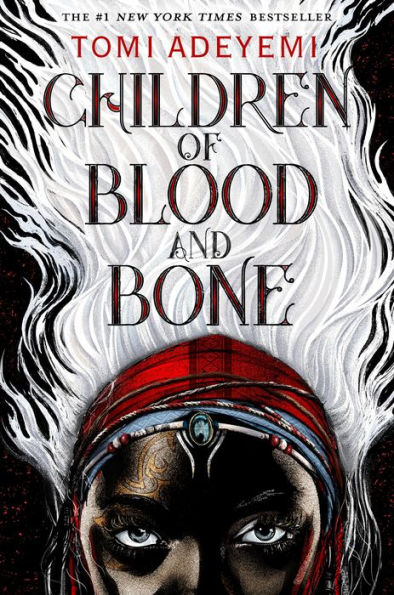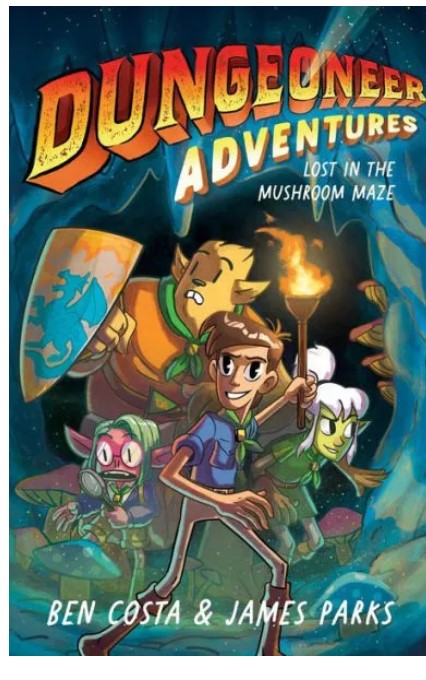Children of Blood and Bone takes place in Orïsha, a rich fantasy landscape where magic users are born with white hair, signaling the powers they will inherit at thirteen. However, an evil king has wiped magic from the land in a genocide of all magic users and severed the people’s connection to the gods. The book alternates between the perspectives of the characters Zélie, Amari, and Inan.
Zélie is a seventeen-year-old girl from a small village, who has been called “maggot” most of her life because of her white hair. After her mother was killed in the slaughter of maji, survivors with white hair became second-class citizens. Bitter and stubborn, Zélie has been taking lessons to fight with a staff while trying to care for her ailing father.
Inan and Amari are the king’s children—the prince and princess of Orïsha. Amari sets off the story’s chain of events when she spies on her father, discovering a scroll that has the power to return magic to the land. Determined not to let it fall into her father’s hands, she runs away with it, and meets Zélie and her brother, Tzain. The three soon find themselves hunted by the king’s army, headed by Inan, who is haunted by an inner conflict over whether the king’s cause is just.
The majority of the narrative follows Zélie, Amari, and Tzain’s journey through Orïsha. While evading capture, they also embark on a quest to reunite the scroll with other ancient artifacts. Their goal is to perform a ritual that can restore the magical connection between the gods and the people of Orïsha.
Children of Blood and Bone includes unique worldbuilding and a magic system that proves central to the plot. Although the switches between narrators are almost dizzying, each character has a unique personality that comes alive on the page. Readers will find themselves sympathizing with the gentle Amari, the stubborn Zélie, and the conflicted Inan in equal measure.
The plot takes a few chapters to get off the ground, and the first act contains an unavoidable amount of worldbuilding. Still, it is packed with action, and the pacing will likely keep the attention of even easily bored readers. As the plot progresses, readers slowly get to see Orïshan’s magic firsthand. Each demonstration of magic will leave readers eager for more.
The story contains two central romances: Tzain and Amari, and Zélie and Inan. Both work rather well: their dynamics complement each other, and a decent amount of chemistry builds up between the two couples. In addition, readers will enjoy watching the friendship between Zélie and Amari develop from hatred into a deep mutual respect.
Fans of fantasy and magic will enjoy Children of Blood and Bone. Despite the fresh new look it gives to its magical land and teenage heroes, Children of Blood and Bone relies on the typical structure of a young adult fantasy. Seasoned readers of the genre will likely recognize the tropes of the “evil king,” the “chosen one,” and the “perilous quest.” These tropes are ubiquitous for a reason, though, and many readers won’t mind. The action, suspense, and intensity will make it irresistible.
Sexual Content
- Amari’s complexion “makes the nobility gossip that [her mother] slept with a servant.”
- Amari sees Tzain undress and lowers her eyes, thinking, “the last time I saw a boy’s bare body my nannies were giving Inan and me baths.”
- Zélie and Tzain meet in a dream. Zélie thinks, “My gods, is he even wearing clothes? My eyes comb over his broad chest, the curves of each muscle. But before I catch sight of anything under the water, I jerk my eyes up.”
- Tzain talks about Inan to Zélie, saying that he “doesn’t care about you, Zél. He just wants to get in between your legs.” A moment later, he calls her “the prince’s whore.”
- Inan describes kissing Zélie. Inan’s “mouth presses against her neck. She gasps as I run my hands up her back. A small moan escapes her lips. . . Her fingers dig into my back, pulling me closer. Everything in me wants her. Wants this. All the time.”
- Zélie and Inan kiss. “Inan presses his lips to mine and everything fades. His kiss is tender yet forceful, gently pushing into me. And his lips . . . soft . . . When he finally pulls away, my heart is beating so fast it feels like I’ve just finished a fight.” Before they are interrupted, they intend on going further. Zélie narrates, “I grab his head and force his lips back onto mine. Restraint can wait for tomorrow. Tonight I want him.”
- Amari watches Zélie and Inan kiss. “The tender way he holds her, the way his hands roam, pulling her into him… an embrace like this is far too intimate to watch.”
- Some drunken guards make a veiled insinuation that Zélie is a prostitute, and one “wraps his pudgy hands around [her] neck and presses [her] against the wooden wall.” Zélie remarks that it’s against the law for maji and non-magic users “to so much as kiss . . . but it doesn’t keep the guards from pawing at us like animals.” Zélie wants to fight back, but forces herself to remain calm until the guard unhands her.
- Later Zélie says, “The guards grope me whenever they have a chance,” and refers to them as “rapists.”
Violence
- During a childhood training session, Amari and Inan’s father (the king) commanded Inan to strike Amari. She still carries around the massive scar.
- Amari watches her father kill her servant Binta, who was her best friend, after seeing her demonstrate magical ability. “One moment Binta stands. In the next, Father’s sword plunges through her chest.”
- Zélie watches a man hit a boy with a cane that burns his skin. “The acrid smell of burning flesh hits me as the stocker presses the cane into the boy’s back. Smoke rises from his skin as he struggles to crawl to his knees.”
- Zélie frequently fights with her staff. She hits a man in the head so hard he collapses. She kicks a man in the jaw. She smashes the bones in a boy’s hand. All of these actions are for survival or self-defense.
- Inan destroys a village and watches a young child try to revive his dead father. “A small child hurls his body to the ground. His cries out through the night. It’s only then I discover the sand-covered corpse at his feet.”
- A woman wearing sharp rings on her fingers smacks a servant, and “the rings cut into his skin.”
- A man is stabbed in the chest, and “his eyes bulge and his mouth falls open. His staff drops from his hand. His blood splatters as it hits the ground.”
- Zélie, Tzain, and Amari compete in a battle to the death. The arena is flooded, and thirty boats are launched out onto the water. A team cannot win until every other competitor has been killed. Zélie narrates, “Chaos surrounds me, pulsing through every breath and heartbeat. It sings as blood splatters through the air, screams as boats explode into oblivion… My insides lurch as a cannonball rips through the deck of another boat. Injured cries hit my ears like shattered glass. The stench of blood stains the air.” The competition lasts for twelve pages.
- Inan accidentally kills a military leader with his magic. “Kaea’s cries of agony grow. Her eyes turn red. Blood trickles from her ears, trailing down her neck . . . A shuddered gasp escapes her lips. Her eyes roll back.”
- Amari beats someone up. Amari pulls “my fist back, twisting from my hips as my fist collides with her jaw. Her head snaps with a lurch. Her eyes roll before she blacks out.”
- A mercenary explains the twenty-three scars on his arm. An unspecified enemy “killed one of my crew members in front of me, each time they carved a new one.”
- When Zélie is captured, the king has the word “maggot” (a hateful slur) carved into her back with a knife. In the same scene, a physician “cuts a shallow X into Zélie’s neck . . . and pushes a thick, hollowed-out needle into the exposed vein . . . removes a small vial of black liquid and prepares to pour the serum down the needle.”
- A Burner (maji of fire) demonstrates his powers in battle. “A fire explodes from his skin. Smoldering embers rain from his body. Flames blaze around his form. The fire erupts from every limb, shooting out of his mouth, his arms, his legs.”
- A Cancer (maji of disease) uses her power in battle. “She leaks dark green energy from her hands, trapping the men in a malignant cloud. The moment it touches the guards, they crumble, skin yellowing as disease rages through them.”
- Zélie watches a young girl get shot with an arrow. “An arrow pierces through her gut… [she] looks down, small hands gripping the arrow’s shaft.”
Drugs and Alcohol
- A mercenary takes “a long drag off a hand-rolled cigarette.”
- When Zélie encounters a palace guard, “the pungent smell of alcohol wafts into the air with his unwelcome presence.”
- The characters drink palm wine during a festival. Later, during an intimate moment with Inan, Zélie thinks, “His words make my head spin. His words or the alcohol.”
Language
- Profanity is used infrequently. Profanity includes: damn and hell.
- Royals and nobles say “Skies!” as an invective.
- Characters say, “Gods” or “Oh my gods.”
- Zélie thinks, “Dammit.”
- Tzain says, “I don’t give a damn.”
- Tzain says, “What the hell are you doing?”
- Amari describes a place as a “hell.”
- Tzain tells Zélie, “You’re always screwing everything up.”
Supernatural
- This book tightly blends the supernatural and the spiritual. The magic system in Orïsha encompasses ideas like higher powers, gods, prayer, human souls, and the afterlife.
- Magic in Orïsha is tied to the Sky Mother, a deity who reigns over all the gods.
- While sleeping, Zélie and Inan use magic to meet in a “dreamscape.”
- As a Reaper, Zélie can sense spirits of the dead, and she can summon them in physical form to do her bidding.
Spiritual Content
- Zélie believes that the gods control her fate. “No matter how much I crave peace, the gods have other plans.”
- Amari and Inan are from nobility and have different beliefs. Amari thinks, “Gods don’t exist. Everyone in the palace knows that.”
- The beliefs held by the Orïshan people also play a bigger part in the plot. In one scene, Zélie enlists the help of mercenaries by telling them, “[the gods] have chosen you because they want your help.”
- Orïshan legend speaks of an afterlife. After a fire in her village claims four lives, Zélie thinks, “If their spirits have ascended to the peace of alâfia, death would be almost a gift. But if they suffered too much before they died . . . If the trauma of their deaths was too much, their spirits won’t rise to the afterlife. They’ll stay in apâdi, an eternal hell, reliving the worst of their pain.”
- Zélie’s narration often uses the word “pray” interchangeably with “wish” and “hope.”
- Zélie can sense people’s souls leaving their bodies as they die.
- Zélie remembers that after the raid, she “cursed the gods for making us this way.”
- During the climax of the book, Zélie has a near-death experience and sees her dead mother’s spirit. Her mother says, “You are a sister of Oya [a goddess], my love. You know our spirits never die.”
by Caroline Galdi










